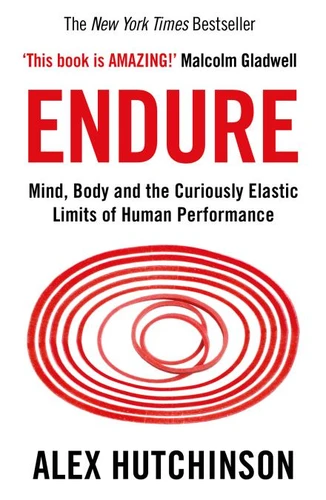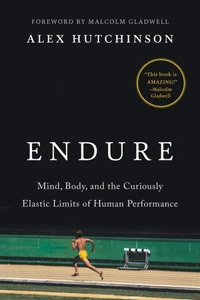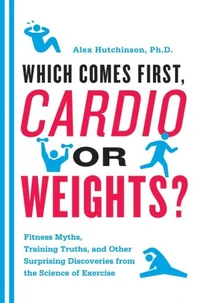Endure. Mind, Body and the Curiously Elastic Limits of Human Performance
Par :Formats :
Disponible dans votre compte client Decitre ou Furet du Nord dès validation de votre commande. Le format ePub protégé est :
- Compatible avec une lecture sur My Vivlio (smartphone, tablette, ordinateur)
- Compatible avec une lecture sur liseuses Vivlio
- Pour les liseuses autres que Vivlio, vous devez utiliser le logiciel Adobe Digital Edition. Non compatible avec la lecture sur les liseuses Kindle, Remarkable et Sony
- Non compatible avec un achat hors France métropolitaine
 , qui est-ce ?
, qui est-ce ?Notre partenaire de plateforme de lecture numérique où vous retrouverez l'ensemble de vos ebooks gratuitement
Pour en savoir plus sur nos ebooks, consultez notre aide en ligne ici
- Nombre de pages320
- FormatePub
- ISBN978-0-00-827707-9
- EAN9780008277079
- Date de parution08/02/2018
- Protection num.Adobe DRM
- Infos supplémentairesepub
- ÉditeurHarperCollins
Résumé
'This book is AMAZING!' - Malcolm Gladwell
'If you want to gain insight into the mind of great athletes, adventurers, and peak performers then prepare to be enthralled by Alex Hutchinson's Endure.' - Bear Grylls
'Anyone who has ever felt exhausted, whether from heat or cold or altitude or pain or simply a loss of will, is going to find their own experience in this book." - David Epstein, author of The Sports Gene
How high or far or fast can humans go? And what about individual potential: what defines a person's limits? From running a two-hour marathon to summiting Mount Everest, we're fascinated by the extremes of human endurance, constantly testing both our physical and psychological limits.
In Endure Alex Hutchinson, Ph.
D., reveals why our individual limits may be determined as much by our head and heart, as by our muscles. He presents an overview of science's search for understanding human fatigue, from crude experiments with electricity and frogs' legs to sophisticated brain imaging technology. Going beyond the traditional mechanical view of human limits, he instead argues that a key element in endurance is how the brain responds to distress signals-whether heat, or cold, or muscles screaming with lactic acid-and reveals that we can train to improve brain response. An elite distance runner himself, Hutchinson takes us to the forefront of the new sports psychology - brain electrode jolts, computer-based training, subliminal messaging - and presents startling new discoveries enhancing the performance of athletes today, showing us how anyone can utilize these tactics to bolster their own performance - and get the most out of their bodies.
D., reveals why our individual limits may be determined as much by our head and heart, as by our muscles. He presents an overview of science's search for understanding human fatigue, from crude experiments with electricity and frogs' legs to sophisticated brain imaging technology. Going beyond the traditional mechanical view of human limits, he instead argues that a key element in endurance is how the brain responds to distress signals-whether heat, or cold, or muscles screaming with lactic acid-and reveals that we can train to improve brain response. An elite distance runner himself, Hutchinson takes us to the forefront of the new sports psychology - brain electrode jolts, computer-based training, subliminal messaging - and presents startling new discoveries enhancing the performance of athletes today, showing us how anyone can utilize these tactics to bolster their own performance - and get the most out of their bodies.
'This book is AMAZING!' - Malcolm Gladwell
'If you want to gain insight into the mind of great athletes, adventurers, and peak performers then prepare to be enthralled by Alex Hutchinson's Endure.' - Bear Grylls
'Anyone who has ever felt exhausted, whether from heat or cold or altitude or pain or simply a loss of will, is going to find their own experience in this book." - David Epstein, author of The Sports Gene
How high or far or fast can humans go? And what about individual potential: what defines a person's limits? From running a two-hour marathon to summiting Mount Everest, we're fascinated by the extremes of human endurance, constantly testing both our physical and psychological limits.
In Endure Alex Hutchinson, Ph.
D., reveals why our individual limits may be determined as much by our head and heart, as by our muscles. He presents an overview of science's search for understanding human fatigue, from crude experiments with electricity and frogs' legs to sophisticated brain imaging technology. Going beyond the traditional mechanical view of human limits, he instead argues that a key element in endurance is how the brain responds to distress signals-whether heat, or cold, or muscles screaming with lactic acid-and reveals that we can train to improve brain response. An elite distance runner himself, Hutchinson takes us to the forefront of the new sports psychology - brain electrode jolts, computer-based training, subliminal messaging - and presents startling new discoveries enhancing the performance of athletes today, showing us how anyone can utilize these tactics to bolster their own performance - and get the most out of their bodies.
D., reveals why our individual limits may be determined as much by our head and heart, as by our muscles. He presents an overview of science's search for understanding human fatigue, from crude experiments with electricity and frogs' legs to sophisticated brain imaging technology. Going beyond the traditional mechanical view of human limits, he instead argues that a key element in endurance is how the brain responds to distress signals-whether heat, or cold, or muscles screaming with lactic acid-and reveals that we can train to improve brain response. An elite distance runner himself, Hutchinson takes us to the forefront of the new sports psychology - brain electrode jolts, computer-based training, subliminal messaging - and presents startling new discoveries enhancing the performance of athletes today, showing us how anyone can utilize these tactics to bolster their own performance - and get the most out of their bodies.






